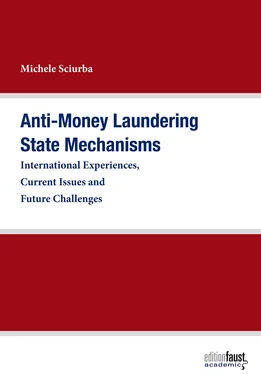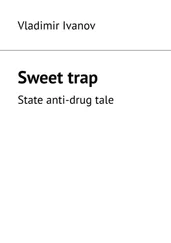
Michele Sciurba
ANTI-MONEY LAUNDERING
STATE MECHANISMS
International Experiences,
Current Issues and Future Challenges
Afterword by Ben Emmerson
Monograph

© 2018 Edition Faust, Frankfurt am Main
All rights reserved, including the right of reproduction in whole or in part in any form.
Designed by Bayerl & Ost, Frankfurt am Main
Printed in Germany
druckhaus köthen, Köthen (Anhalt);
circulation 800 copies signed to print on 12 February 2018
Michele Sciurba
Anti-Money Laundering State Mechanisms: International Experiences, Current Issues and Future Challenges: Monograph / Public Administrative Law / Michele Sciurba / Edition Faust Academic, 2018. – 160 pp.: Annex – Afterword: pp. 123-160
.
Executive editor/Leitende Lektorin: Sarah Schuster
Bibliografische Information der Deutschen Nationalbibliothek
Die Deutsche Nationalbibliothek verzeichnet diese Publikation in der Deutschen Nationalbibliografie; detaillierte bibliografische Daten sind im Internet abrufbar über < http://dnb.d-nb.de>
German National Library Cataloguing in Publication Data
A catalogue record for this book is available from the German National Library
UDC 35.08 (082+083)
ISBN 978-3-945400-55-5
eISBN 978-3-945400-62-3
Preface
I.Theoretical and Methodological Aspects of Anti-Money Laundering State Regulation: The US Experience
I.1Brief History of Combating Money Laundering
I.2The Bank Secrecy Act 1970: A Model for Modern AML Regimes
I.3The Current AML Regime in the US
I.4The USA Patriot Act
I.4.1The USA Patriot Act’s Effect on Financial Institutions
I.4.2Consequences of the New Sanction Regime under the USA Patriot Act: BNP Paribas and Commerzbank
I.5Conclusion
II.The Global Financial Crisis’ Worldwide Impact on the Implementation of Anti-Money Laundering Standards in the OECD Countries
II.1The Extension of International Anti-Money Laundering Objectives
II.2Combating Tax Evasion under the Anti-Money Laundering Framework
II.3The EU AML Regime’s Development Subsequent to the 4th AMLD in View of Future Regulatory Challenges
II.4Conclusion
III.Anti-Money Laundering and Counter-Terrorist Financing State Mechanisms in the European Union
III.1The Fight against Organised Crime in the European Union
III.2The Unfinished Task of Harmonising EU Criminal Law
III.3The Significance of Article 82 TFEU for the Cross-Border Prosecution of Financial and Organised Crime
III.4Conclusion
IV.The Fourth Anti-Money Laundering Directive: EU Policy Undermining The Rights To Privacy and Data Protection of EU Citizens
IV.1The 4th Anti-Money Laundering Directive
IV.2The Current AML Regime in the EU
IV.3Inefficiencies of Current Anti-Money Laundering and Counter-Terrorism Financing State Mechanisms in the Prevention of Terrorist Attacks
IV.4The Latest Issues for the EU Anti-Money Laundering Regime: Brexit and the Fifth Anti-Money Laundering Directive
IV.5Conclusion
V.Human Rights Violations and Discriminatory Side Effects in the Fight against Terrorism: Current Anti-Money Laundering and Counter-Terrorism Financing Policies in the UK
V.1The Principle of Confidentiality and Loyalty
V.2Progressive Abrogation of Banking Secrecy
V.3Areas of Discrimination under the Current AML and CTF Mechanisms: Evidences from the UK
V.4Applications of AML and CTF Rules in Breach of Human Rights Law
V.5Conclusion
VI.International Institutional Cooperation and Standard Setting in the Fight against Money Laundering and Terrorism Financing
VI.1The Creation of an International Anti-Money Laundering Network
VI.2International Cooperation of FATF, IMF and World Bank
VI.3Unsolved Problems in International Institutional Cooperation
VI.4Conclusion
VII.Corruption in the Ukraine, Brazil and Equatorial Guinea: Economical, Social And Political Consequences
VII.1The Symbiotic Relationship between Corruption and Money Laundering
VII.2Recent Juridical and Administrative Developments in the Ukraine
VII.3The Integration Process of the Ukraine into the European Union
VII.4The Current AML Regime in the Ukraine
VII.5Corruption in Brazil: The Petrobras Scandal
VII.6Recent Anti-Corruption and AML Improvements and Reforms in Brazil
VII.7Administrative Corruption in Equatorial Guinea
VII.8The Influence of Oil on Equatorial Guinea’s Economy
VII.9Recent Anti-Corruption Developments in Equatorial Guinea
VII.10Conclusion
VIII.The Global Impact of the Growing Compliance Industry on Financial Institutions in the Fight against Money Laundering, Terrorism Financing and Tax Evasion
VIII.1The Compliance Obligation of Financial Institutions
VIII.2The Rise of Compliance Requirements: Strengthening AML Policies
VIII.3Adverse Consequences of Growing Compliance for Financial Institutions
VIII.4Conclusion
Annex
List of Abbreviations
Index
Bibliography
Table of Cases
European Court of Human Rights
International Law Sources
EU Legislation
European Commission Documents
Statutes and Statutory Instruments
Recommendations, Guidelines and Standards
Books
Journal Articles, Reports and Studies
Newspaper and Online Sources
Acknowledgement
Curriculum Vitae
Afterword
This academic work examines the objectives, development, implementation and effectiveness of global anti-money laundering regulations in the US and EU and the impact of their present implementation on civil and human rights. Anti-money laundering (AML) legislation was originally aimed at protecting financial institutions from misuse and only subsequently was expanded to include counter-terrorism financing (CTF) regulations. The implementation of these regulations have largely suspended the norms and laws governing privacy and bank secrecy, turning banks and other financial institutions into an extension of law enforcement. They have also imposed burdensome reporting requirements on banks, which in order to avoid legal liability and sanctions imposed by AML/CTF legislation for non-compliance have engaged in excessive and early reporting of suspicious financial activities. Banking de-risking policies have placed ordinary citizens under a general blanket of suspicion and resulted in them being denied bank accounts or having existing bank accounts closed. In addition, banks appear to use these policies to rid themselves of legitimate but less profitable customers, who are often socially at risk. As a result, the implementation of the AML/CTF legal framework as it stands is discriminatory and infringes the European Convention on Human Rights and the Charter of Fundamental Human Rights of the European Union.
The political pressure to combat international terrorism in the wake of 9/11 sparked a flurry of AML/CTF legislation aimed at cutting off funding for terrorists. In the US, there was the passage of the USA Patriot Act 2001 and the tightening of the Bank Secrecy Act 1970; in the UK the Proceeds of Crime Act 2002 was passed and at the EU level the Fourth Anti-Money Laundering Directive (4th AMLD) was implemented. These laws added tax evasion to the list of money launering offences and, in conjunction with current Financial Action Task Force (FATF) Recommendations, have created a change from a punitive to a preventive rationale for this legislation.
Читать дальше














